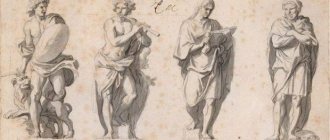The basis of personality
Temperament is a certain biological basis on which personality is built. Temperament determines the mechanisms of psychological activity and the ability to socially adapt. On its basis, social properties of the psyche are formed. From a physiological point of view, temperament is a type of higher nervous activity.
Scientists consider Hippocrates to be the father of the theory of human temperament. Later, the philosopher and physician Claudius Galen developed this theory and became the author of the scientific treatise “Correct Measure.” This work describes four types of temperament according to basic biological substances. Blood plays a key role in the formation of the sanguine type. For a choleric person, the main substance is bile. The phlegmatic type develops under the strong influence of phlegm. And melancholic in a person is determined by the so-called “black bile”.
No type of temperament is found in its pure form. Every person has a basic temperament, developing or suppressing it depending on circumstances. In different situations, the same person is capable of exhibiting traits of all four types.
Characteristics of a melancholic person
Strengths:
- Deep and thoughtful
- Analytic mind
- Serious and focused
- Gifted
- Talented and creative
- Artistic and musical
- Ability for philosophy or poetry
- Connoisseur of beauty
- Sensitive to others
- Selfless
- Conscientious
- Idealist
Weak sides:
- Remembers negative moments
- Tendency to mood swings and depression
- Likes to be offended
- Head in the clouds
- Low self-esteem
- Selectively listens
- Concentrated on himself
- Closed
- Often feels guilty
- Prone to persecution mania
- Prone to hypochondria
Melancholic at work
- Sticks to schedule
- Perfectionist, sets high standards
- Pays attention to details
- Persistent and thorough
- Organized
- Careful
- Economical
- Sees problems
- Finds non-standard solutions
- Loves graphs and lists
Most suitable professions
and in the fields of: research, arts, science, administration, social work
Melancholic friend
- Makes friends with caution
- Prefers to stay in the shadows
- Tries not to attract attention to himself
- Devoted and faithful
- Ready to listen to complaints
- Can solve other people's problems
- Concerned about other people
- Looking for the perfect partner
Properties of temperament
Each type of temperament is determined by the presence of specific properties, namely:
Extraversion and introversion
These qualities are based on emotional reactions, on the speed of volitional actions.
Activity and passivity
These properties show a person’s reaction to negative events and difficulties, and also determine the degree of his endurance, perseverance and determination.
Sensitivity
It manifests itself in the strength of the influence of external stimuli that force the psyche to react in one way or another. Different people react to the same event in completely different ways.
Reactivity
This term refers to an involuntary reaction of the psyche to irritating factors (they can be both external and internal).
Plasticity and rigidity
These qualities show a person’s ability to adapt to the environment and adapt to new circumstances.
Reactive Activity Rate
This property determines how quickly the psyche reacts to external stimuli.
Emotional excitability
Using this property, you can determine how much a person is able to control his emotions, speech and mental reactions.
Choleric
They belong to an unbalanced, overly mobile type of psyche. They are aggressive, impulsive, quick-tempered, but not vindictive. They make persuasive speakers, able to organize people and help them make the right decisions. Unrestrained, sometimes rude choleric people do not show their love and tenderness to loved ones, considering these emotions useless.
Choleric people are confident that they are always right in everything, so they prefer not to listen to the advice of others. On the contrary, they strive to control loved ones, imposing on them their point of view and views on behavior. To establish a harmonious relationship with a choleric person, you must follow 7 rules of interaction:
- He speaks first and thinks later. The interlocutor should not make hasty conclusions based on what was said.
- It must be remembered that choleric people are controlled by emotions, most often negative. Therefore, in a calm state, he is able to change his opinion to the opposite.
- During a quarrel, an individual is capable of saying a lot of unpleasant things. This does not mean that he actually had such an opinion on the topic of conversation.
- You should not immediately be offended by the angry tirades of a choleric person. You should be patient and forgiving.
- They do not remember minor quarrels and are often surprised that people can be offended by them.
- It is undesirable to put pressure on an individual.
- He needs understanding and support.
It is especially difficult for the other halves of choleric people, since the type is jealous and prone to scandals. But their mood quickly changes.
Positive sides
Despite the explosive and complex temperament, choleric people can have a lot of positive qualities that help them make their way in life and achieve their goals. Main advantages of the type:
- Purposefulness and determination.
- Self-sufficiency and independence from other people's opinions.
- Activity and dynamism.
- Energy and mobility.
- Passionate and straightforward.
- Resilience and self-confidence.
- They take on new work with enthusiasm.
The type is characterized by leadership qualities, so choleric people become wonderful leaders, capable of skillfully managing their subordinates. The profession of a businessman and journalist, surgeon and manager, actor and investigator suits them. Activities related to accounting or training will quickly get boring for a choleric person, so it is better for him to avoid these areas.
READ How to increase self-esteem: identifying and eliminating the causes of self-doubt
Flaws
Individuals with strong temperaments are not without shortcomings. The obvious disadvantages include:
- They love to command, which is not always liked by friends or colleagues.
- They love to argue, proving that they are right.
- They hate losing. They turn themselves inside out to achieve victory, even if losing is inevitable.
- Impatient, aggressive and hot-tempered. Any trifle can make them angry.
- They are overly impulsive, so they do not know how to relax completely.
- They lack sentimentality and do not like it when other people show it.
- Unfriendly and unresponsive.
Cholerics should learn to extinguish their emotions in order to maintain a cool mind in unforeseen and difficult situations. This will save them from making decisions that they will later regret. Cholerics need to take note of the 10-second tactic. Its essence is that a person must count to 10 before saying his thoughts out loud. During this short time, the intensity of emotions subsides, and it is easier for the choleric person to cope with the surge of anger or irritation.
How is temperament different from character?
A person's temperament should not be identified with his character. The first term includes a set of genetic characteristics of the psyche. Temperament is formed in utero, it cannot be changed, but can only be superficially corrected by working on oneself and correctly setting life priorities.
Character is formed throughout life, changing in one direction or another. Interacting in the social sphere, individuals exchange behavioral and mental experiences, influence others and are subconsciously influenced by others.
Sanguine
These people are incorrigible optimists who find it difficult to sit in one place. They love to be in the thick of things, to be the center of everyone's attention, clearly expressing their individuality.
Sanguine people are very sociable. They are drawn to people, and they reciprocate. But despite this, you should know the recommendations for communicating with individuals of the communicative type:
- Their friendliness suggests that conflict with sanguine people is impossible. This is an erroneous judgment because it is impossible to predict what will come into their minds.
- Sanguine people are somewhat superficial. Because of this property, they often draw incorrect conclusions.
- It is impossible to get them to confess to their wrong actions.
- Representatives of the type like it when someone is interested in their views and asks for advice.
- They love to develop plans, reason, and solve pressing issues in the company of a loved one.
- They love extreme sports.
- A sanguine person has all his feelings written on his face. It is worth observing him a little in different situations in order to better understand the displayed facial range of feelings.
Sanguine people are lively, temperamental people who constantly need new experiences. A monotonous life does not suit them, so they are able to quickly break off boring connections. But if a partner or friend never ceases to amaze them and gives them a positive charge of energy, then a sanguine person will never part with such a person.
Pros of temperament
Sanguine people are open, friendly, get along well with other people and infect them with their own enthusiasm. Among the positive aspects of dynamic temperament, it should be noted:
- An excellent sense of humor that helps the owner become the soul of the company.
- Sociability and cheerfulness. A simple trip to the store can turn into an exciting adventure.
- Sincerity and curiosity.
- Emotionality and persuasiveness.
- He doesn’t look back, but lives for today.
Sanguine people, thanks to their innate hyperactivity, try to travel more. Getting to know new cities and countries, they fill their lives with vivid impressions and positive emotions, which they will subsequently share with their close circle.
Negative sides
Sanguine people easily manage to reach the heights of success in matters related to communication. They make excellent administrators, journalists, salespeople and entrepreneurs. However, they lack organization and self-discipline. Other negative aspects include:
- Superficiality and talkativeness. It’s hard to call him a devoted friend.
- Carelessness and selfishness.
- Naivety and reluctance to grow up and plunge into problems.
- Forgetfulness and slight aggressiveness.
- Impatience and inattention.
Sanguine people have similar traits to choleric people, but they are more balanced and less harsh. A peculiarity of temperament is that a person is ready to grab hold of a proposed project, but is able to bring it to the finish line only when the matter completely captures the mind.
READ In search of mutual understanding: who is an introvert and how to find a common language with him
Two of a Kind?
The interaction of colleagues and their labor relations directly depend on their temperaments.
Choleric-phlegmatic
The perfect couple. Each of them has qualities that the other does not have, they complement each other and this is why they like each other. The phlegmatic person patiently endures the emotional outbursts of the choleric person, who likes him for his thoroughness, reliability and responsibility. The choleric person in phlegmatic finds a quiet haven, stability and peace, at the same time does not allow him to get stuck in passivity, constantly spurs him on and activates him, periodically even tries to control him.
Sanguine-choleric
A very active, life-oriented union. They have something to talk about, something to help each other with. At the same time, mutual assistance, although not complete, is very significant: for a choleric person - on the organizational side, for a sanguine person - in putting plans into practice. The choleric person thinks, the sanguine person carries out. However, sometimes an exchange of opinions can develop into arguments and quarrels, insistence on one’s point of view and rivalry. To maintain balance, it is necessary to adapt to each other, and this should be done by both parties and equally.
Melancholic-sanguine
A promising alliance with mutual respect and tact. Mutual assistance can be very effective: on the part of a melancholic person - on a spiritual, internal level, and on the part of a sanguine person - on a social level. A melancholic person feels best with a sanguine person: the irrational switches of the first not only do not irritate him, but, on the contrary, provide him with new interesting impressions and distract him from sad thoughts. A sanguine person gets along well with a melancholic person due to his balance and sociability.
Melancholic-phlegmatic
The relationship in this couple is relatively calm. They pay little attention to each other, since both are immersed in their inner world. A melancholic person may not like the apparent slowness and passivity of a phlegmatic person, and a phlegmatic person may not like the increased anxiety and excessive restlessness of a melancholic person. However, there is no tangible discomfort in the relationship. They are also not particularly interested in rivalry and disputes. In such a union, there will inevitably be sympathy and respect for the inner world of the other person, but at the same time, alienation will increase due to a lack of initiative.
Sanguine-phlegmatic
Quite an interesting form of union. There is little mutual understanding, but mutual assistance is significant and active. Especially when there are common interests and practical issues in the business sphere. Good cooperation is ensured by the social activity of a sanguine person and the hard work of a phlegmatic person. However, a sanguine person cannot be denied practicality and thoroughness. Conflicts in such a couple are insignificant, since both feel a practical need for each other, which they value much higher than defending their opinion. Usually in this pair the sanguine person is the leader, and the phlegmatic person, having easily ceded his authority, turns out to be a follower.
Melancholic-choleric
The cooperation of these two types is highly undesirable, because the domineering choleric person will quickly and peremptorily “enslave” the timid and quiet melancholic person. The straightforwardness often unconscious to a choleric person, despite all his caution, will hurt a very sensitive melancholic person. As a result, tension, discomfort, and mutual accusations will arise between them. They have mutual understanding, but within narrow limits. There is little mutual assistance in this couple, although it can be significant: in some situations, the choleric person can look after or take the melancholic person under his protection.
Temperament squared
If people have the same type of temperament, then the most favorable combination will be two phlegmatic or melancholic people, somewhat worse - two sanguine people, and very bad - two choleric people.
This situation is easily explained: phlegmatic people are the most balanced people, they are difficult to anger. Melancholic people are impressionable, very vulnerable and touchy, but they are quite compliant and prone to compromise in order to achieve peace of mind. Sanguine people are independent and emotional, but easy-going. Noticing that the brewing conflict could take a serious turn, they easily compromise to restore balance in their relations with each other. It is most difficult for two straightforward, excitable and uncontrollable choleric people to maintain balance in a relationship.
| Combination | Favorable | Working | Poorly compatible |
| sanguine | melancholic | sanguine, choleric | phlegmatic person |
| choleric | phlegmatic person | sanguine | choleric, melancholic |
| phlegmatic person | choleric | melancholic, phlegmatic, sanguine | works well with everyone |
| melancholic | sanguine | phlegmatic, melancholic | choleric |
The theory of I. P. Pavlov
The fact that the course of mental processes and the behavior of an individual depends on the work of the nervous system, which plays a dominant role in the body, has been known for a long time. But the theory of the connection between temperament types and certain general properties of nervous processes was first proposed by the Russian physiologist I. P. Pavlov. It was subsequently developed by his followers.
In the understanding of Academician Pavlov, the type of nervous system is innate and is least subject to any changes under the influence of upbringing or environment. The properties of the nervous system, according to his ideas, form the physiological basis for temperament, which is a mental manifestation of the general type of the nervous system. Pavlov's subsequent studies on animals made it possible to identify types of nervous systems, which he proposed to extend to humans as well.
Who is who?
A brief description of each temperament, based on the nervous activity of its owner:
Sanguine - strong, balanced, agile;
Choleric - strong, unbalanced, mobile;
Phlegmatic - strong, balanced, inert;
Melancholic - weak, unbalanced, inactive.
A person’s belonging to one of the four temperaments can be determined situationally - by his reaction to an obstacle that arises in his path: a choleric person sweeps him away; the sanguine person bypasses; a phlegmatic person often doesn’t even notice; the melancholic person stops before an obstacle.
Melancholic - positive and negative qualities, suitable professions and activities
Quite a complex psychotype with unstable reactions.
Positive sides:
- Gullible
- Creative personalities
- Prone to compassion
- Friendly
- They know how to listen
- Loyal to your soulmate
- Good friends
Negative sides:
- Prone to depression
- Pessimistic
- Prone to criticism
- They don’t know how to communicate with people and don’t want to
- Avoid noisy companies
Recommended professions:
- System Administrator
- Programmer
- Librarian
- Editor
Melancholic - positive and negative qualities, suitable professions and activities







